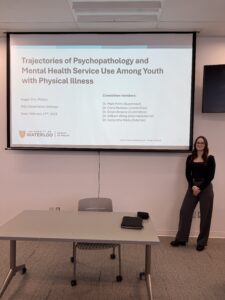The ARCH Lab collaborated on a paper with colleagues from the COMPASS study, titled “Associations between longitudinal patterns of substance use and anxiety and depression symptoms among a sample of Canadian secondary school students”.
The purpose of this study was to examine the longitudinal associations between latent classes of substance use and anxiety and depression scores among youth who use substances. The study used data from three waves of the COMPASS study. Students in grades 9 and 10 who reported substance use at baseline (n = 738) reported their substance use (alcohol, cannabis, cigarettes, and e-cigarettes) and anxiety and depression symptoms at each wave. After controlling for relevant covariates, consistent poly-substance use, defined as the concurrent use of more than one substance within a specified period, is associated with depression but not anxiety. Escalating poly-substance use is associated with depression among males.
These findings should be taken into consideration when creating prevention programming and treatment strategies for adolescents. Substance use programming should be comprehensive, consider multiple substances, and be cognizant of symptoms of mental illness, particularly depression.






